Christian Morality: Examining Its Relevance in Contemporary Society
VerifiedAdded on 2022/08/25
|8
|2126
|28
Essay
AI Summary
This essay provides a comprehensive overview of Christian morality, exploring its foundations in the Bible and the teachings of Jesus. It examines the core principles, such as loving God and one's neighbor, and how these principles guide decision-making. The essay delves into the challenges of applying Christian morality in contemporary society, considering ethical dilemmas related to war, wealth, and sexuality. It analyzes the influence of historical contexts, societal changes, and diverse interpretations on the evolution of Christian ethics. The essay also critiques specific ideas within Christian doctrine and concludes that while the Bible offers valuable guidance, its application requires discernment and adaptation to the present environment. The essay emphasizes the importance of charity and love in leading a Christian life while acknowledging that morality is not solely confined to religious teachings.
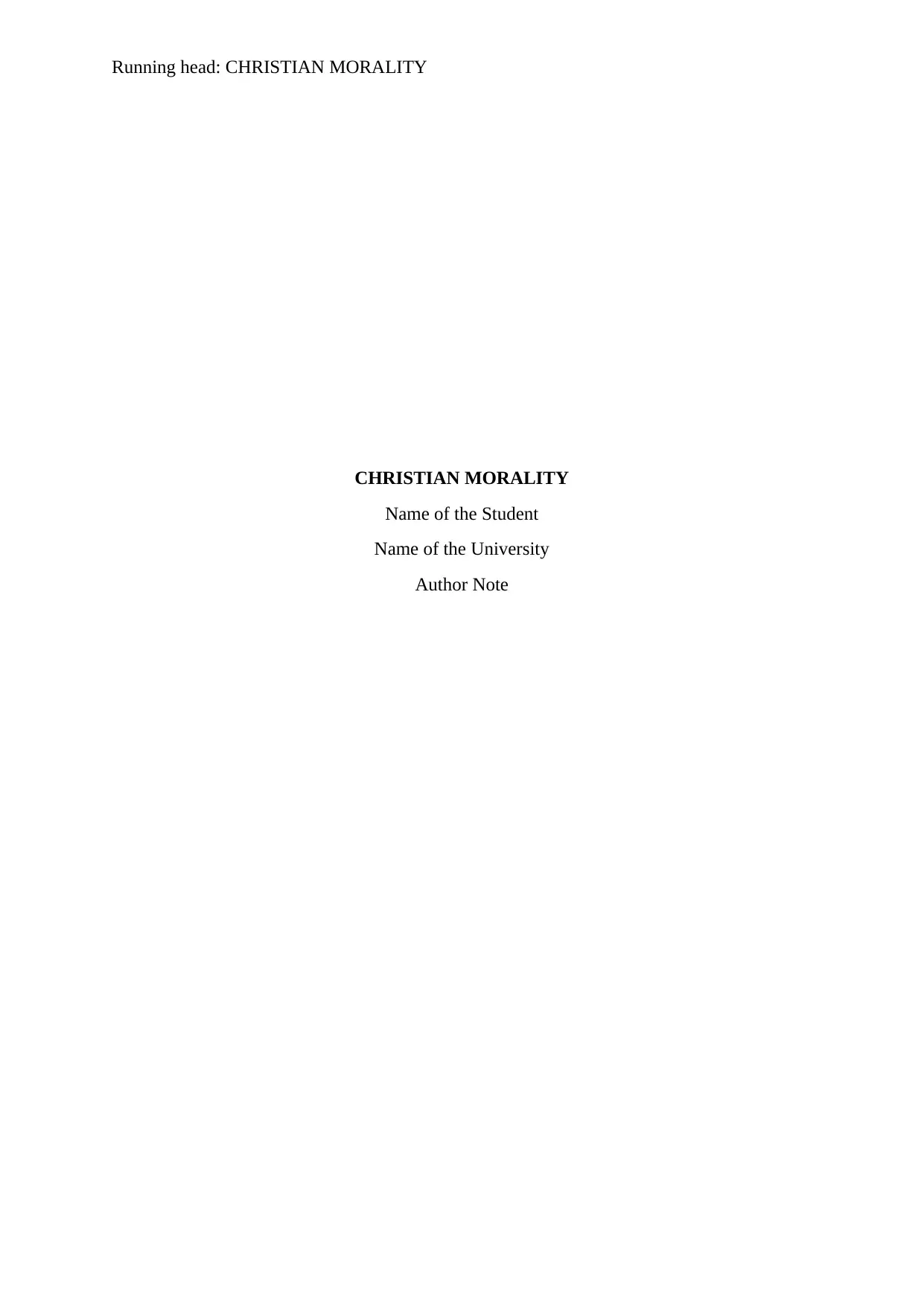
Running head: CHRISTIAN MORALITY
CHRISTIAN MORALITY
Name of the Student
Name of the University
Author Note
CHRISTIAN MORALITY
Name of the Student
Name of the University
Author Note
Paraphrase This Document
Need a fresh take? Get an instant paraphrase of this document with our AI Paraphraser
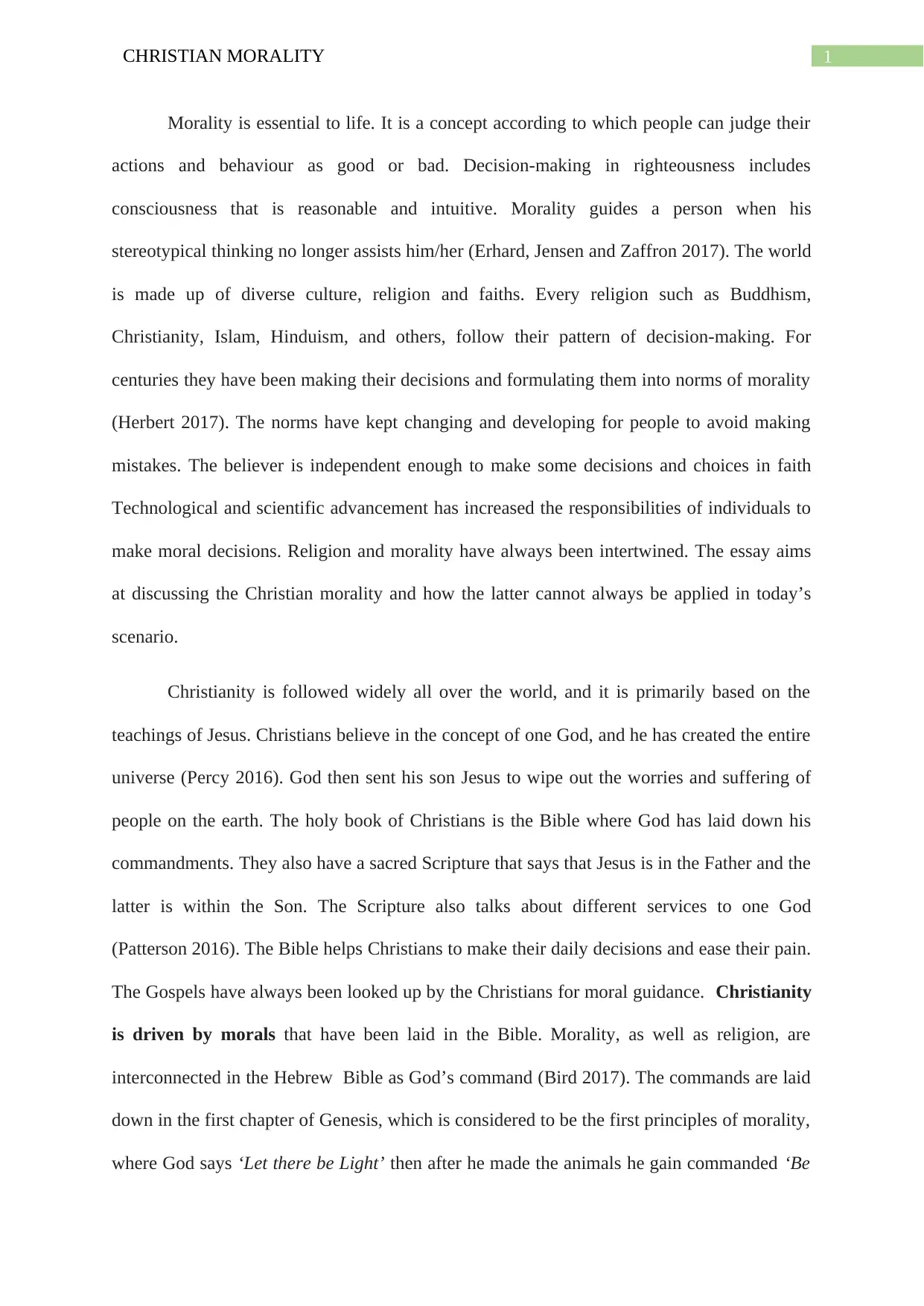
1CHRISTIAN MORALITY
Morality is essential to life. It is a concept according to which people can judge their
actions and behaviour as good or bad. Decision-making in righteousness includes
consciousness that is reasonable and intuitive. Morality guides a person when his
stereotypical thinking no longer assists him/her (Erhard, Jensen and Zaffron 2017). The world
is made up of diverse culture, religion and faiths. Every religion such as Buddhism,
Christianity, Islam, Hinduism, and others, follow their pattern of decision-making. For
centuries they have been making their decisions and formulating them into norms of morality
(Herbert 2017). The norms have kept changing and developing for people to avoid making
mistakes. The believer is independent enough to make some decisions and choices in faith
Technological and scientific advancement has increased the responsibilities of individuals to
make moral decisions. Religion and morality have always been intertwined. The essay aims
at discussing the Christian morality and how the latter cannot always be applied in today’s
scenario.
Christianity is followed widely all over the world, and it is primarily based on the
teachings of Jesus. Christians believe in the concept of one God, and he has created the entire
universe (Percy 2016). God then sent his son Jesus to wipe out the worries and suffering of
people on the earth. The holy book of Christians is the Bible where God has laid down his
commandments. They also have a sacred Scripture that says that Jesus is in the Father and the
latter is within the Son. The Scripture also talks about different services to one God
(Patterson 2016). The Bible helps Christians to make their daily decisions and ease their pain.
The Gospels have always been looked up by the Christians for moral guidance. Christianity
is driven by morals that have been laid in the Bible. Morality, as well as religion, are
interconnected in the Hebrew Bible as God’s command (Bird 2017). The commands are laid
down in the first chapter of Genesis, which is considered to be the first principles of morality,
where God says ‘Let there be Light’ then after he made the animals he gain commanded ‘Be
Morality is essential to life. It is a concept according to which people can judge their
actions and behaviour as good or bad. Decision-making in righteousness includes
consciousness that is reasonable and intuitive. Morality guides a person when his
stereotypical thinking no longer assists him/her (Erhard, Jensen and Zaffron 2017). The world
is made up of diverse culture, religion and faiths. Every religion such as Buddhism,
Christianity, Islam, Hinduism, and others, follow their pattern of decision-making. For
centuries they have been making their decisions and formulating them into norms of morality
(Herbert 2017). The norms have kept changing and developing for people to avoid making
mistakes. The believer is independent enough to make some decisions and choices in faith
Technological and scientific advancement has increased the responsibilities of individuals to
make moral decisions. Religion and morality have always been intertwined. The essay aims
at discussing the Christian morality and how the latter cannot always be applied in today’s
scenario.
Christianity is followed widely all over the world, and it is primarily based on the
teachings of Jesus. Christians believe in the concept of one God, and he has created the entire
universe (Percy 2016). God then sent his son Jesus to wipe out the worries and suffering of
people on the earth. The holy book of Christians is the Bible where God has laid down his
commandments. They also have a sacred Scripture that says that Jesus is in the Father and the
latter is within the Son. The Scripture also talks about different services to one God
(Patterson 2016). The Bible helps Christians to make their daily decisions and ease their pain.
The Gospels have always been looked up by the Christians for moral guidance. Christianity
is driven by morals that have been laid in the Bible. Morality, as well as religion, are
interconnected in the Hebrew Bible as God’s command (Bird 2017). The commands are laid
down in the first chapter of Genesis, which is considered to be the first principles of morality,
where God says ‘Let there be Light’ then after he made the animals he gain commanded ‘Be
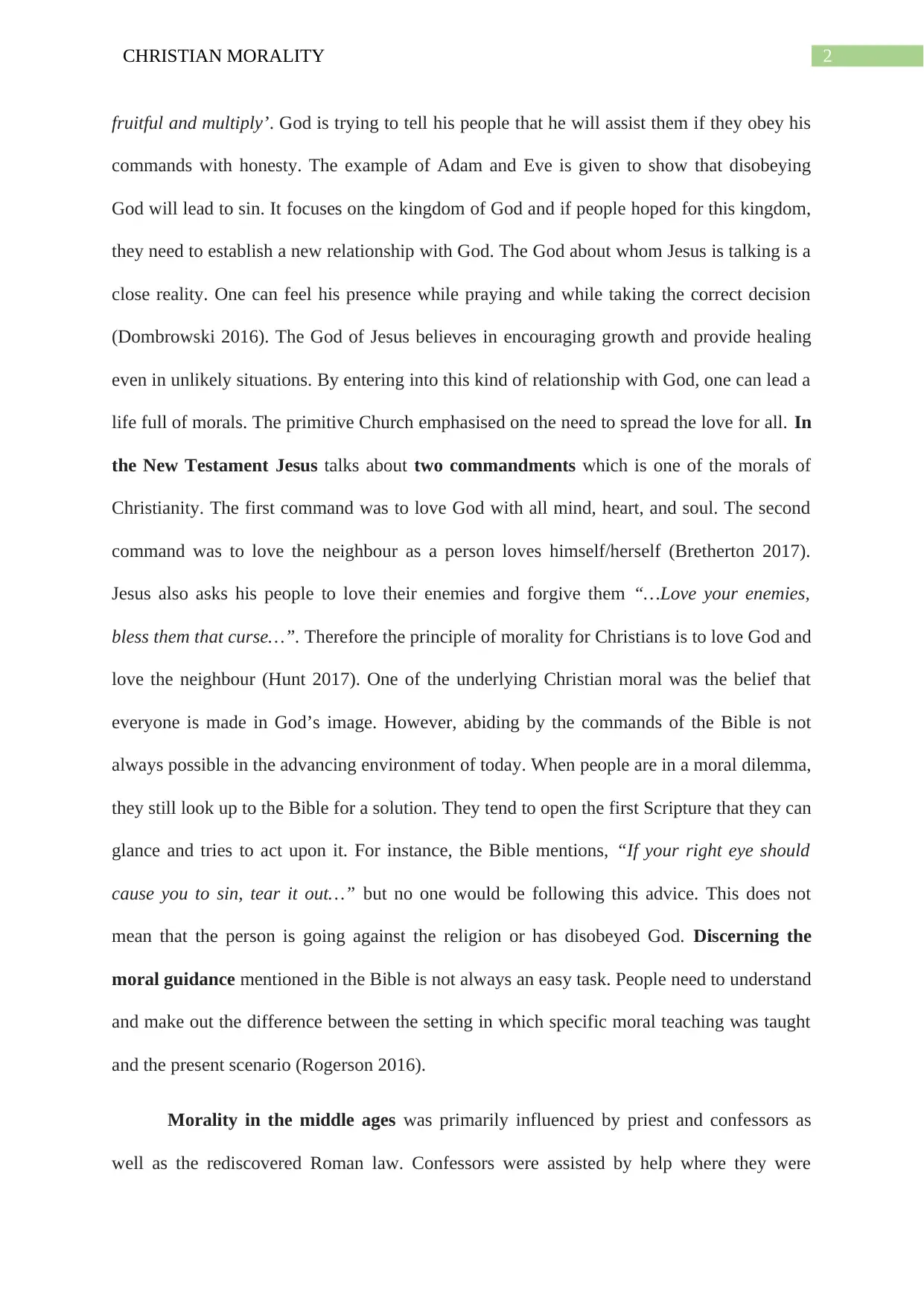
2CHRISTIAN MORALITY
fruitful and multiply’. God is trying to tell his people that he will assist them if they obey his
commands with honesty. The example of Adam and Eve is given to show that disobeying
God will lead to sin. It focuses on the kingdom of God and if people hoped for this kingdom,
they need to establish a new relationship with God. The God about whom Jesus is talking is a
close reality. One can feel his presence while praying and while taking the correct decision
(Dombrowski 2016). The God of Jesus believes in encouraging growth and provide healing
even in unlikely situations. By entering into this kind of relationship with God, one can lead a
life full of morals. The primitive Church emphasised on the need to spread the love for all. In
the New Testament Jesus talks about two commandments which is one of the morals of
Christianity. The first command was to love God with all mind, heart, and soul. The second
command was to love the neighbour as a person loves himself/herself (Bretherton 2017).
Jesus also asks his people to love their enemies and forgive them “…Love your enemies,
bless them that curse…”. Therefore the principle of morality for Christians is to love God and
love the neighbour (Hunt 2017). One of the underlying Christian moral was the belief that
everyone is made in God’s image. However, abiding by the commands of the Bible is not
always possible in the advancing environment of today. When people are in a moral dilemma,
they still look up to the Bible for a solution. They tend to open the first Scripture that they can
glance and tries to act upon it. For instance, the Bible mentions, “If your right eye should
cause you to sin, tear it out…” but no one would be following this advice. This does not
mean that the person is going against the religion or has disobeyed God. Discerning the
moral guidance mentioned in the Bible is not always an easy task. People need to understand
and make out the difference between the setting in which specific moral teaching was taught
and the present scenario (Rogerson 2016).
Morality in the middle ages was primarily influenced by priest and confessors as
well as the rediscovered Roman law. Confessors were assisted by help where they were
fruitful and multiply’. God is trying to tell his people that he will assist them if they obey his
commands with honesty. The example of Adam and Eve is given to show that disobeying
God will lead to sin. It focuses on the kingdom of God and if people hoped for this kingdom,
they need to establish a new relationship with God. The God about whom Jesus is talking is a
close reality. One can feel his presence while praying and while taking the correct decision
(Dombrowski 2016). The God of Jesus believes in encouraging growth and provide healing
even in unlikely situations. By entering into this kind of relationship with God, one can lead a
life full of morals. The primitive Church emphasised on the need to spread the love for all. In
the New Testament Jesus talks about two commandments which is one of the morals of
Christianity. The first command was to love God with all mind, heart, and soul. The second
command was to love the neighbour as a person loves himself/herself (Bretherton 2017).
Jesus also asks his people to love their enemies and forgive them “…Love your enemies,
bless them that curse…”. Therefore the principle of morality for Christians is to love God and
love the neighbour (Hunt 2017). One of the underlying Christian moral was the belief that
everyone is made in God’s image. However, abiding by the commands of the Bible is not
always possible in the advancing environment of today. When people are in a moral dilemma,
they still look up to the Bible for a solution. They tend to open the first Scripture that they can
glance and tries to act upon it. For instance, the Bible mentions, “If your right eye should
cause you to sin, tear it out…” but no one would be following this advice. This does not
mean that the person is going against the religion or has disobeyed God. Discerning the
moral guidance mentioned in the Bible is not always an easy task. People need to understand
and make out the difference between the setting in which specific moral teaching was taught
and the present scenario (Rogerson 2016).
Morality in the middle ages was primarily influenced by priest and confessors as
well as the rediscovered Roman law. Confessors were assisted by help where they were
⊘ This is a preview!⊘
Do you want full access?
Subscribe today to unlock all pages.

Trusted by 1+ million students worldwide
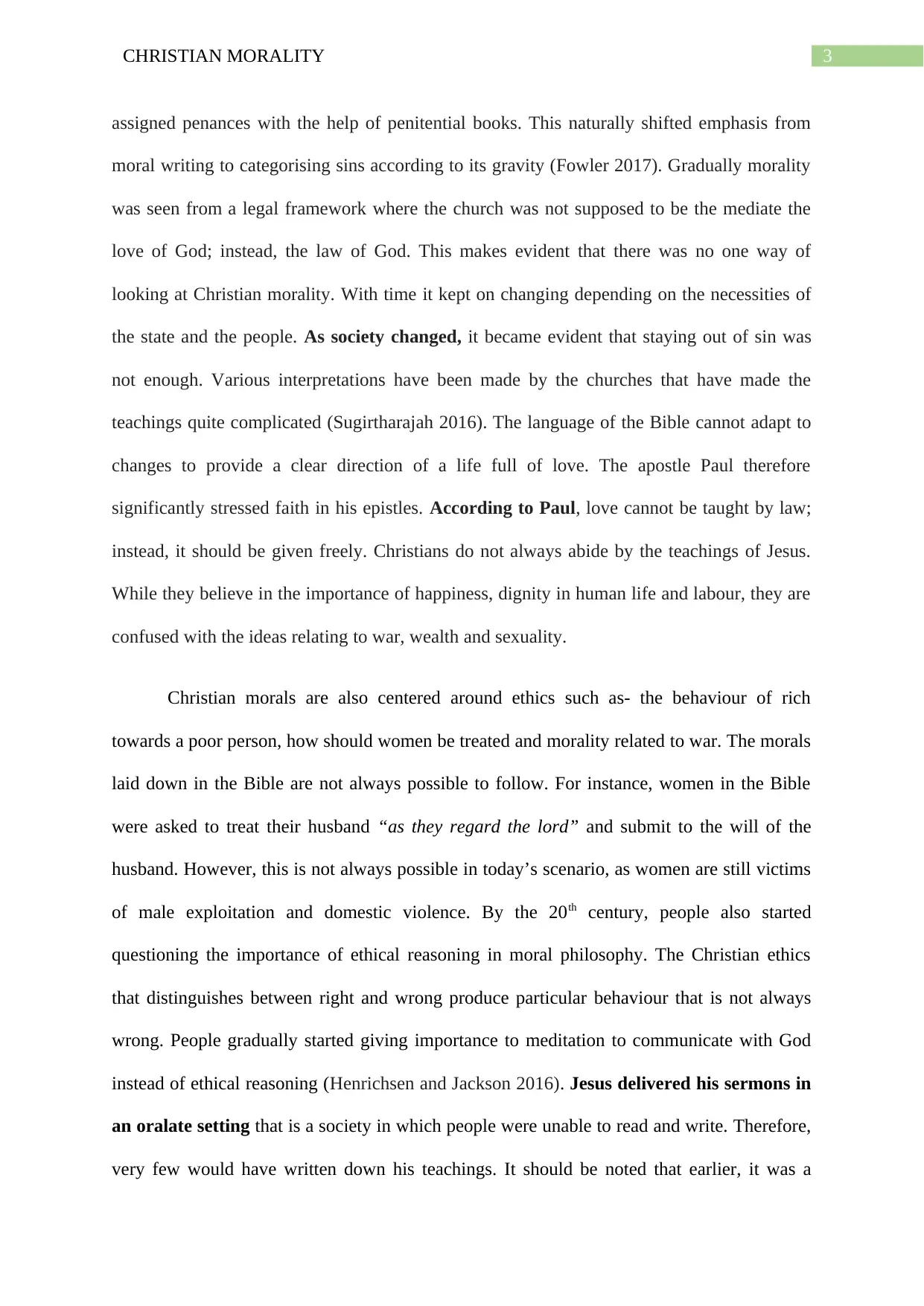
3CHRISTIAN MORALITY
assigned penances with the help of penitential books. This naturally shifted emphasis from
moral writing to categorising sins according to its gravity (Fowler 2017). Gradually morality
was seen from a legal framework where the church was not supposed to be the mediate the
love of God; instead, the law of God. This makes evident that there was no one way of
looking at Christian morality. With time it kept on changing depending on the necessities of
the state and the people. As society changed, it became evident that staying out of sin was
not enough. Various interpretations have been made by the churches that have made the
teachings quite complicated (Sugirtharajah 2016). The language of the Bible cannot adapt to
changes to provide a clear direction of a life full of love. The apostle Paul therefore
significantly stressed faith in his epistles. According to Paul, love cannot be taught by law;
instead, it should be given freely. Christians do not always abide by the teachings of Jesus.
While they believe in the importance of happiness, dignity in human life and labour, they are
confused with the ideas relating to war, wealth and sexuality.
Christian morals are also centered around ethics such as- the behaviour of rich
towards a poor person, how should women be treated and morality related to war. The morals
laid down in the Bible are not always possible to follow. For instance, women in the Bible
were asked to treat their husband “as they regard the lord” and submit to the will of the
husband. However, this is not always possible in today’s scenario, as women are still victims
of male exploitation and domestic violence. By the 20th century, people also started
questioning the importance of ethical reasoning in moral philosophy. The Christian ethics
that distinguishes between right and wrong produce particular behaviour that is not always
wrong. People gradually started giving importance to meditation to communicate with God
instead of ethical reasoning (Henrichsen and Jackson 2016). Jesus delivered his sermons in
an oralate setting that is a society in which people were unable to read and write. Therefore,
very few would have written down his teachings. It should be noted that earlier, it was a
assigned penances with the help of penitential books. This naturally shifted emphasis from
moral writing to categorising sins according to its gravity (Fowler 2017). Gradually morality
was seen from a legal framework where the church was not supposed to be the mediate the
love of God; instead, the law of God. This makes evident that there was no one way of
looking at Christian morality. With time it kept on changing depending on the necessities of
the state and the people. As society changed, it became evident that staying out of sin was
not enough. Various interpretations have been made by the churches that have made the
teachings quite complicated (Sugirtharajah 2016). The language of the Bible cannot adapt to
changes to provide a clear direction of a life full of love. The apostle Paul therefore
significantly stressed faith in his epistles. According to Paul, love cannot be taught by law;
instead, it should be given freely. Christians do not always abide by the teachings of Jesus.
While they believe in the importance of happiness, dignity in human life and labour, they are
confused with the ideas relating to war, wealth and sexuality.
Christian morals are also centered around ethics such as- the behaviour of rich
towards a poor person, how should women be treated and morality related to war. The morals
laid down in the Bible are not always possible to follow. For instance, women in the Bible
were asked to treat their husband “as they regard the lord” and submit to the will of the
husband. However, this is not always possible in today’s scenario, as women are still victims
of male exploitation and domestic violence. By the 20th century, people also started
questioning the importance of ethical reasoning in moral philosophy. The Christian ethics
that distinguishes between right and wrong produce particular behaviour that is not always
wrong. People gradually started giving importance to meditation to communicate with God
instead of ethical reasoning (Henrichsen and Jackson 2016). Jesus delivered his sermons in
an oralate setting that is a society in which people were unable to read and write. Therefore,
very few would have written down his teachings. It should be noted that earlier, it was a
Paraphrase This Document
Need a fresh take? Get an instant paraphrase of this document with our AI Paraphraser
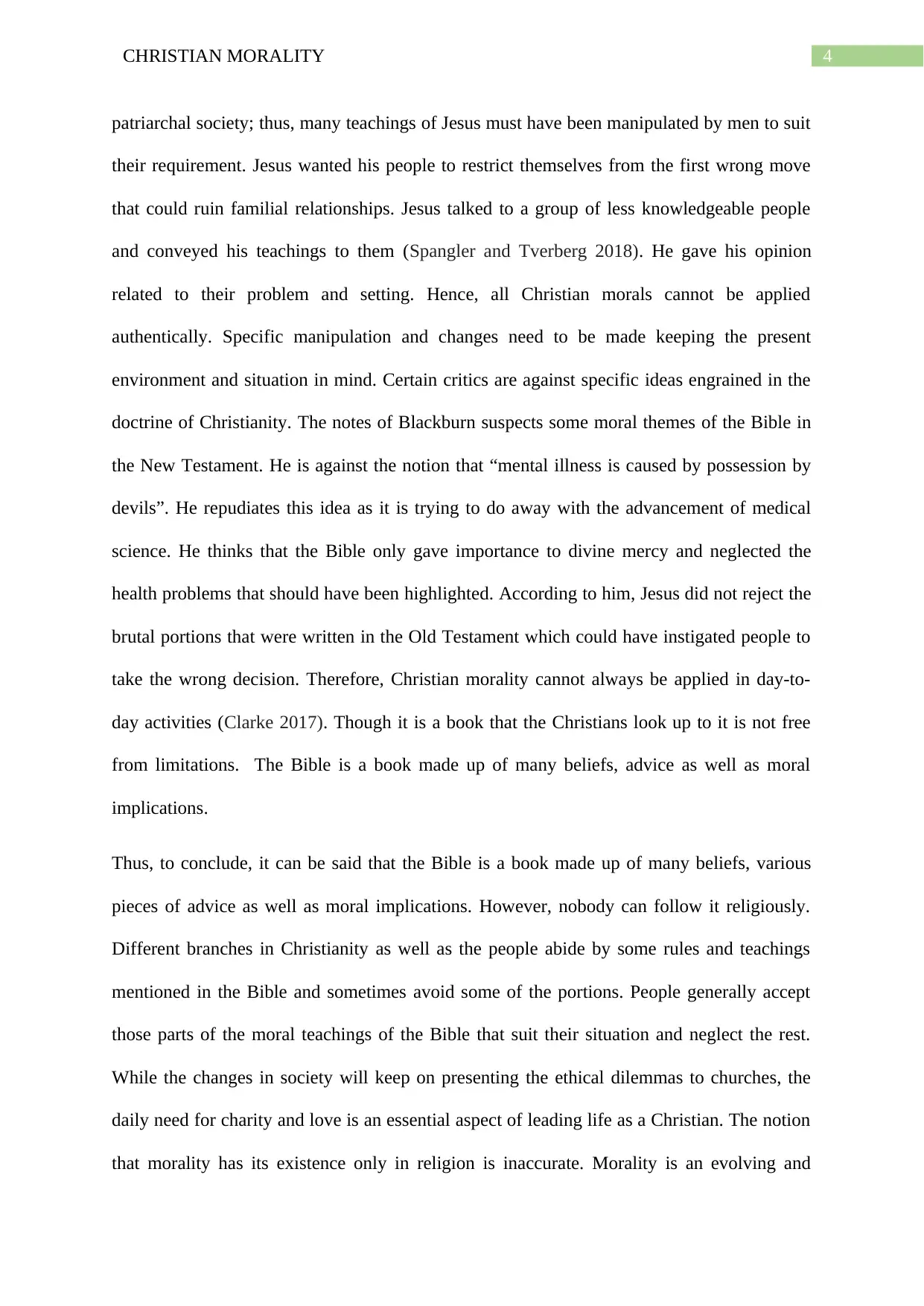
4CHRISTIAN MORALITY
patriarchal society; thus, many teachings of Jesus must have been manipulated by men to suit
their requirement. Jesus wanted his people to restrict themselves from the first wrong move
that could ruin familial relationships. Jesus talked to a group of less knowledgeable people
and conveyed his teachings to them (Spangler and Tverberg 2018). He gave his opinion
related to their problem and setting. Hence, all Christian morals cannot be applied
authentically. Specific manipulation and changes need to be made keeping the present
environment and situation in mind. Certain critics are against specific ideas engrained in the
doctrine of Christianity. The notes of Blackburn suspects some moral themes of the Bible in
the New Testament. He is against the notion that “mental illness is caused by possession by
devils”. He repudiates this idea as it is trying to do away with the advancement of medical
science. He thinks that the Bible only gave importance to divine mercy and neglected the
health problems that should have been highlighted. According to him, Jesus did not reject the
brutal portions that were written in the Old Testament which could have instigated people to
take the wrong decision. Therefore, Christian morality cannot always be applied in day-to-
day activities (Clarke 2017). Though it is a book that the Christians look up to it is not free
from limitations. The Bible is a book made up of many beliefs, advice as well as moral
implications.
Thus, to conclude, it can be said that the Bible is a book made up of many beliefs, various
pieces of advice as well as moral implications. However, nobody can follow it religiously.
Different branches in Christianity as well as the people abide by some rules and teachings
mentioned in the Bible and sometimes avoid some of the portions. People generally accept
those parts of the moral teachings of the Bible that suit their situation and neglect the rest.
While the changes in society will keep on presenting the ethical dilemmas to churches, the
daily need for charity and love is an essential aspect of leading life as a Christian. The notion
that morality has its existence only in religion is inaccurate. Morality is an evolving and
patriarchal society; thus, many teachings of Jesus must have been manipulated by men to suit
their requirement. Jesus wanted his people to restrict themselves from the first wrong move
that could ruin familial relationships. Jesus talked to a group of less knowledgeable people
and conveyed his teachings to them (Spangler and Tverberg 2018). He gave his opinion
related to their problem and setting. Hence, all Christian morals cannot be applied
authentically. Specific manipulation and changes need to be made keeping the present
environment and situation in mind. Certain critics are against specific ideas engrained in the
doctrine of Christianity. The notes of Blackburn suspects some moral themes of the Bible in
the New Testament. He is against the notion that “mental illness is caused by possession by
devils”. He repudiates this idea as it is trying to do away with the advancement of medical
science. He thinks that the Bible only gave importance to divine mercy and neglected the
health problems that should have been highlighted. According to him, Jesus did not reject the
brutal portions that were written in the Old Testament which could have instigated people to
take the wrong decision. Therefore, Christian morality cannot always be applied in day-to-
day activities (Clarke 2017). Though it is a book that the Christians look up to it is not free
from limitations. The Bible is a book made up of many beliefs, advice as well as moral
implications.
Thus, to conclude, it can be said that the Bible is a book made up of many beliefs, various
pieces of advice as well as moral implications. However, nobody can follow it religiously.
Different branches in Christianity as well as the people abide by some rules and teachings
mentioned in the Bible and sometimes avoid some of the portions. People generally accept
those parts of the moral teachings of the Bible that suit their situation and neglect the rest.
While the changes in society will keep on presenting the ethical dilemmas to churches, the
daily need for charity and love is an essential aspect of leading life as a Christian. The notion
that morality has its existence only in religion is inaccurate. Morality is an evolving and
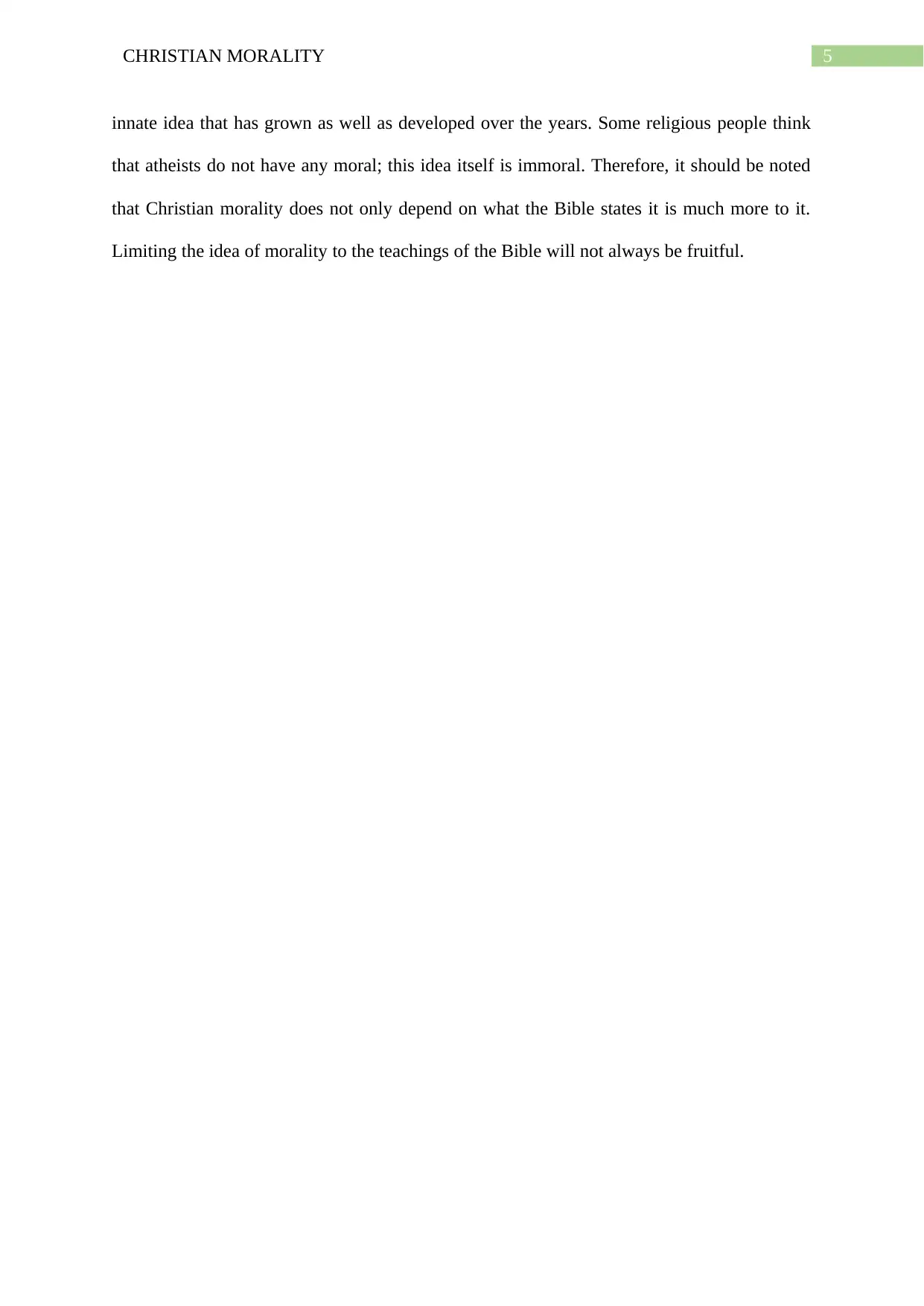
5CHRISTIAN MORALITY
innate idea that has grown as well as developed over the years. Some religious people think
that atheists do not have any moral; this idea itself is immoral. Therefore, it should be noted
that Christian morality does not only depend on what the Bible states it is much more to it.
Limiting the idea of morality to the teachings of the Bible will not always be fruitful.
innate idea that has grown as well as developed over the years. Some religious people think
that atheists do not have any moral; this idea itself is immoral. Therefore, it should be noted
that Christian morality does not only depend on what the Bible states it is much more to it.
Limiting the idea of morality to the teachings of the Bible will not always be fruitful.
⊘ This is a preview!⊘
Do you want full access?
Subscribe today to unlock all pages.

Trusted by 1+ million students worldwide
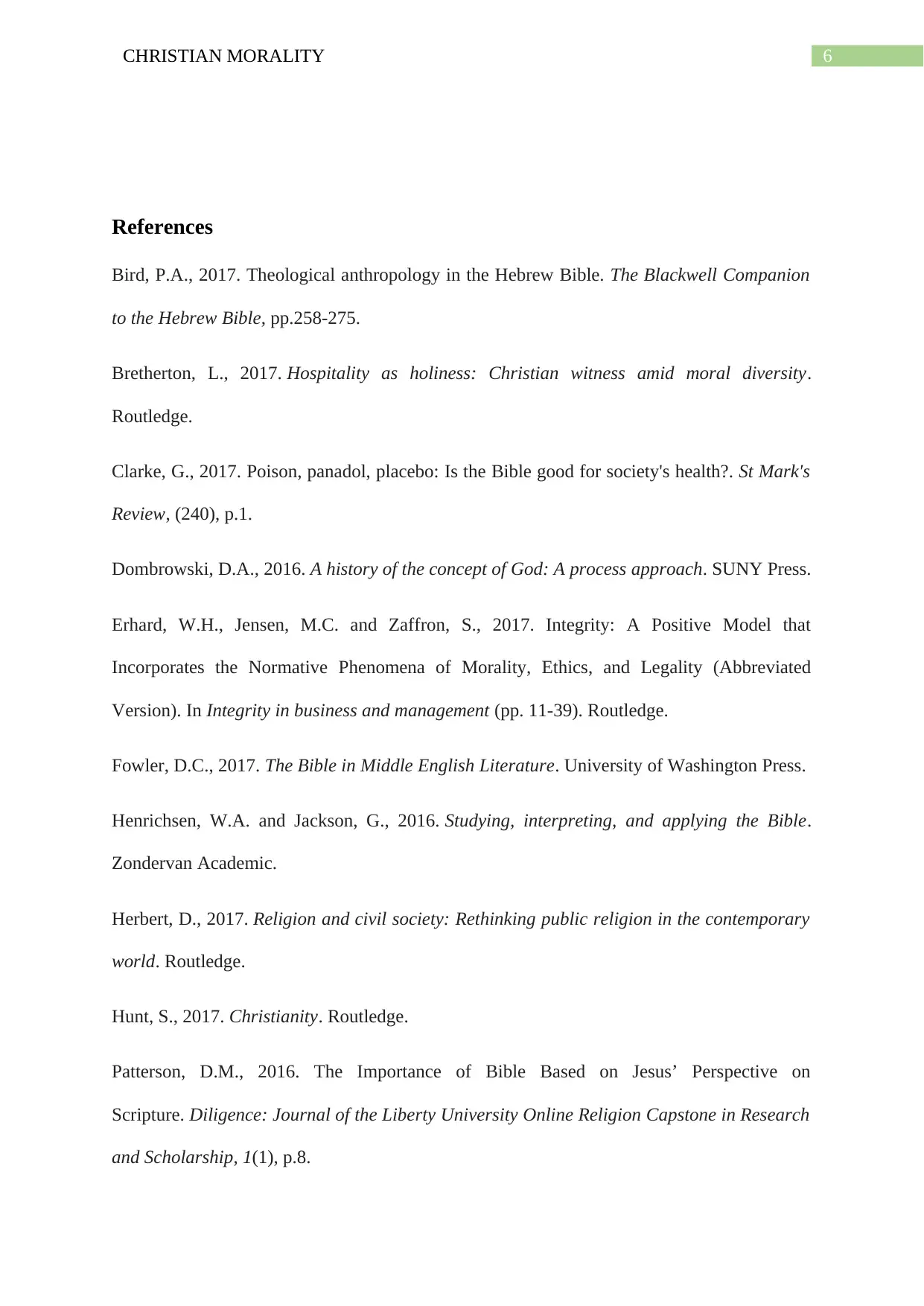
6CHRISTIAN MORALITY
References
Bird, P.A., 2017. Theological anthropology in the Hebrew Bible. The Blackwell Companion
to the Hebrew Bible, pp.258-275.
Bretherton, L., 2017. Hospitality as holiness: Christian witness amid moral diversity.
Routledge.
Clarke, G., 2017. Poison, panadol, placebo: Is the Bible good for society's health?. St Mark's
Review, (240), p.1.
Dombrowski, D.A., 2016. A history of the concept of God: A process approach. SUNY Press.
Erhard, W.H., Jensen, M.C. and Zaffron, S., 2017. Integrity: A Positive Model that
Incorporates the Normative Phenomena of Morality, Ethics, and Legality (Abbreviated
Version). In Integrity in business and management (pp. 11-39). Routledge.
Fowler, D.C., 2017. The Bible in Middle English Literature. University of Washington Press.
Henrichsen, W.A. and Jackson, G., 2016. Studying, interpreting, and applying the Bible.
Zondervan Academic.
Herbert, D., 2017. Religion and civil society: Rethinking public religion in the contemporary
world. Routledge.
Hunt, S., 2017. Christianity. Routledge.
Patterson, D.M., 2016. The Importance of Bible Based on Jesus’ Perspective on
Scripture. Diligence: Journal of the Liberty University Online Religion Capstone in Research
and Scholarship, 1(1), p.8.
References
Bird, P.A., 2017. Theological anthropology in the Hebrew Bible. The Blackwell Companion
to the Hebrew Bible, pp.258-275.
Bretherton, L., 2017. Hospitality as holiness: Christian witness amid moral diversity.
Routledge.
Clarke, G., 2017. Poison, panadol, placebo: Is the Bible good for society's health?. St Mark's
Review, (240), p.1.
Dombrowski, D.A., 2016. A history of the concept of God: A process approach. SUNY Press.
Erhard, W.H., Jensen, M.C. and Zaffron, S., 2017. Integrity: A Positive Model that
Incorporates the Normative Phenomena of Morality, Ethics, and Legality (Abbreviated
Version). In Integrity in business and management (pp. 11-39). Routledge.
Fowler, D.C., 2017. The Bible in Middle English Literature. University of Washington Press.
Henrichsen, W.A. and Jackson, G., 2016. Studying, interpreting, and applying the Bible.
Zondervan Academic.
Herbert, D., 2017. Religion and civil society: Rethinking public religion in the contemporary
world. Routledge.
Hunt, S., 2017. Christianity. Routledge.
Patterson, D.M., 2016. The Importance of Bible Based on Jesus’ Perspective on
Scripture. Diligence: Journal of the Liberty University Online Religion Capstone in Research
and Scholarship, 1(1), p.8.
Paraphrase This Document
Need a fresh take? Get an instant paraphrase of this document with our AI Paraphraser
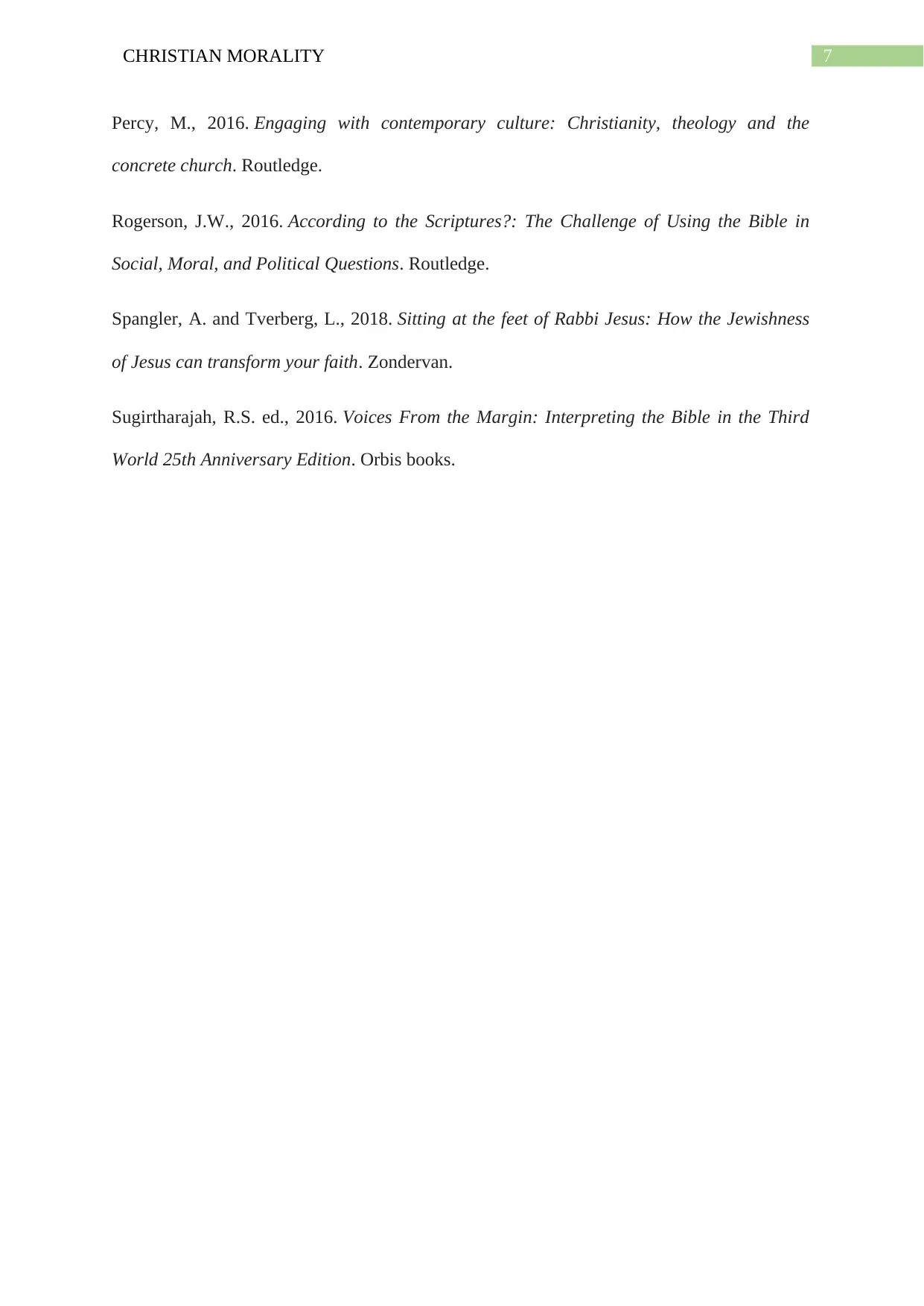
7CHRISTIAN MORALITY
Percy, M., 2016. Engaging with contemporary culture: Christianity, theology and the
concrete church. Routledge.
Rogerson, J.W., 2016. According to the Scriptures?: The Challenge of Using the Bible in
Social, Moral, and Political Questions. Routledge.
Spangler, A. and Tverberg, L., 2018. Sitting at the feet of Rabbi Jesus: How the Jewishness
of Jesus can transform your faith. Zondervan.
Sugirtharajah, R.S. ed., 2016. Voices From the Margin: Interpreting the Bible in the Third
World 25th Anniversary Edition. Orbis books.
Percy, M., 2016. Engaging with contemporary culture: Christianity, theology and the
concrete church. Routledge.
Rogerson, J.W., 2016. According to the Scriptures?: The Challenge of Using the Bible in
Social, Moral, and Political Questions. Routledge.
Spangler, A. and Tverberg, L., 2018. Sitting at the feet of Rabbi Jesus: How the Jewishness
of Jesus can transform your faith. Zondervan.
Sugirtharajah, R.S. ed., 2016. Voices From the Margin: Interpreting the Bible in the Third
World 25th Anniversary Edition. Orbis books.
1 out of 8
Related Documents
Your All-in-One AI-Powered Toolkit for Academic Success.
+13062052269
info@desklib.com
Available 24*7 on WhatsApp / Email
![[object Object]](/_next/static/media/star-bottom.7253800d.svg)
Unlock your academic potential
Copyright © 2020–2026 A2Z Services. All Rights Reserved. Developed and managed by ZUCOL.





